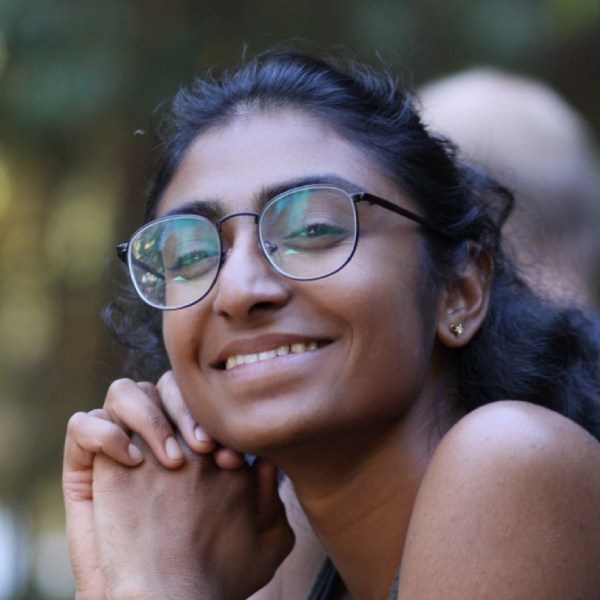MCRP candidate Rithikha Rajamohan (2023) created a film for an Experimental Filmmaking course last year with Professor Albert G. Nigrin titled “Sympoiesis”. The short was chosen to screen at the 41st New Jersey Film Festival during an in-person and online shorts program on Saturday January 28th at 5pm.
More info on her short and tickets to see the program
We asked Rithikha about her inspiration for the film and how it relates to her work as a graduate student in Urban Planning at the Bloustein School.
What was the inspiration for the film?
I was going down an internet rabbit hole last year and I came across this paper written in 1998 by Beth Dempster who was an Urban Planning PhD student at the University of Waterloo at the time who was thinking about self-organizing systems in the context of cities and relating it to her background in ecology. She proposed a new term, Sympoiesis, in this paper, meaning “making-with”, “boundaryless” or “collectively producing” to respond to the thinking at the time that emphasized independent, solitary mechanisms for how nature, and therefore societies should work. She created the term as a balancer; a term that people could use to tell new (though I would argue, go back to older) stories about how we relate to the world and to one another, pushing back against the narrative we’ve been told for so long, and are still told today that the only way we can thrive is through individualism and competition.
So those were some things I had on my mind and at the same time, I had been collecting what I called “video bytes” over the last few years. These were 10 – 45 second video shots that I would film during travels, on walks around my neighbourhood, etc. Really just an exercise in observation, capturing things that caught my eye as beautiful, strange or a bit magical within the day to day. I’d been wanting to piece these clips together for a while and as I was taking an experimental film course with Al Nigrin in the Rutgers Cinema Studies Department that term I thought this would be a good time to create a more cohesive narrative with these clips. That’s when I got to work and also reached out to an old friend, Tim Duyzer, to compose the musical score for it, which is the wonderful combination of organic and electronic sounds you hear during the film.
I was also inspired by a quote by Lewis Thomas, an American physician, who in his book of essays, The Fragile Species, described human beings as no more than adolescents in evolutionary time, a young and fragile species prone to making mistakes and a lot of stupidity (I found his framing funny as we can all remember our antics as teenagers). Regardless, the destruction and the resulting polycrisis we’ve caused during our short time on the planet isn’t anything to be proud of, but I wanted the film to be a more comforting reminder that we’re still learning, growing and striving to figure out how we best fit into an inherently symbiotic world. In Thomas’ words, “if we can last it out, get through the phase…we might find ourselves off and running again,” and I think the only way to do that is through a sympoietic approach; making together and getting rid of some of the arbitrary boundaries we’ve put up between people and across fields of work and study.
How does it relate to your graduate work at the Bloustein School and how will this film help you on your career path?
I think knowing how to tell a story is so important in this field, and not just to be able to communicate complicated planning processes to the general public, but I think for an even more important reason: to expand people’s ideas of what’s possible in the world and of what they can ask of each other and their cities. At the end of the day, the role of an artist and the role of planner isn’t so different in that we both work to help people imagine what different realities could look like, and inspired by art, to do our best to implement these imagined realities too. Science fiction stories and experimental genres have always resonated with me because they encourage the fact that people see and experience life in different and often complex ways. These experiences can be contradictory sometimes, but they can still all be true at the same time. Experimental techniques I think are an especially great way to explore the social, ecological and technological issues of our time because of its use of the abstract, making ideas which are intangible in present-day reality, more tangible through the imagination. I genuinely believe if we’re going to get out of this mess we’ve made, it will all come down to our ability to imagine and continue re-imagining, together, what a better world could look like. It’s a muscle we should all be flexing a bit more.
Other takeways from the filmmaking process
Things really came full circle when I found out over the break that Beth is from Vancouver, Canada, where I’ve lived for the past 7 years and runs a community cafe along the seawall there called The Convivial Cafe & Bakery. I had the chance to chat with her over the holidays and learn a bit more about her journey from an urban planning PhD student, to becoming a community builder and leading thinker in self-organizing systems; influencing others such as Donna Haraway and setting the stage for ideas brought up again over 10 years later, by amazing writers and researchers like Anna Tsing, author of The Mushroom at the End of the World. It was inspiring to see these ideas pop up at the nexus of ecology and urban planning and I’m excited to explore them more at Bloustein and beyond.

